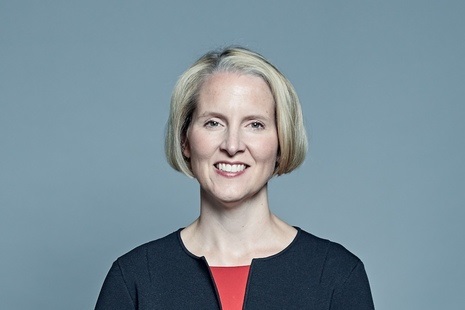The new UK Labour government has appointed Emma Reynolds (pictured) as pensions minister with a brief covering both HM Treasury and the Department for Work and Pensions.
Reynolds was appointed parliamentary secretary on 9 July 2024 after getting elected earlier in the month as the MP for Wycombe.
In early reaction Jon Greer, head of retirement policy at Quilter said: “Despite being out of government for 14 years, Labour has opted for an experienced parliamentarian as its Minister for Pensions, with the appointment of Emma Reynolds. While she has little pensions experience to speak of, she has previously served in parliament for nearly a decade prior to her re-election last week.
“Furthermore, her most recent experience being at TheCityUK financial services trade association should give her a good starting point from a knowledge perspective and provide potential to grow into the role. With experienced hands such as two-time Minister for Pensions Sir Stephen Timms also being appointed at the Department for Work and Pensions, we hope this will give stability to an industry that is so vital to the health and economy of this nation.
Greer continued: “This appointment does give the view that Labour will treat pensions with the thought and consideration that is required, not least because the role is a joint appointment with the Treasury and DWP. Given the importance and complexity of pensions, it is positive to see the role being recognised for having implications across departments. After a number of years of pensions being used as a political football, we hope Labour’s huge majority will give it enough cover to sensibly plan reform and improve upon the current regime where possible.
“While her pensions experience may be lacking, in her previous stint in parliament Reynolds has shown some understanding of the issues facing the sector – including debating on the implementation of the pensions dashboard and pension credit reforms. She will now use that experience to take forward Labour’s plans to review the pensions landscape. It is critical that this results in more people saving for retirement and there are levers that can be pulled to help achieve this, notably around automatic enrolment and extending access while also adjusting contribution thresholds.
“There is also political desire across parliament to stimulate the UK economy and its financial centres. As such, we are likely to see a continuation of Jeremy Hunt’s Mansion House reforms to push pension funds to invest more in UK assets. It will be interesting to see what steps Labour’s pension review will consider to increase productive investment in the UK economy and to encouraging a greater home bias in asset allocation decisions.
He further said: “We know from Labour’s manifesto that the state pension triple lock will be maintained. But this is likely to come under more and more pressure, particularly given the state of public finances and demographic trends. We need policy that works for the long-term and a state pension uprating system that is pegged to average earnings would be a fairer option that should make the state pension sustainable for future generations. With such a healthy majority we would want to see bold action from Emma Reynolds to start a debate about the future of the triple lock and just how sustainable it can be.
“Outside of Sir Steve Webb and Guy Opperman, the pensions industry has had to put up with an ever-revolving door of ministers. Even someone experienced like Sir Stephen Timms himself never made it to a year in charge in his previous two stints. Hopefully Emma Reynolds can come in and provide some stability over the course of this parliament, especially when it is people’s retirement and ability to maintain living standards in old age that is at stake.”
Rachel Vahey, head of public policy at AJ Bell, said: “The area of pensions has always sat, somewhat uncomfortably, between two masters. The DWP is responsible for paying state pensions and the regulations for occupational schemes. But ultimately it was always the Treasury that had the upper hand, with control over the financials – setting pensions tax rules and the level of state pensions.
“Historically, pensions ministers and Treasury ministers have had to rub along together, both having a say in people’s income in later life. But in a breath of fresh air, the new Labour government is seeking to ease this tension by appointing a minister that has a foot in both camps and should have the clout in both departments to get things done.
“Reynolds is taking on the mantle of pensions minister at a vital time. The new government is relying on growth in the UK economy to help meet spending commitments. In its manifesto, it promised a review of pensions, with the aim of improving outcomes and encouraging greater levels of investment in UK Plc. The latter will likely mean a continuation of the ‘Mansion House’ agenda started by the previous government, which has placed a particular focus on boosting private equity holdings in occupational pension schemes.
“And whilst the review is ongoing and the bonnet is up, the Labour government may take the opportunity to consider other changes, such as changes to pensions tax. Reynolds’ new dual role will make it much easier to bring that into the fold of one overall review.
“But there are several other issues crying out for the new minister’s attention, including launching pensions dashboards to the public and considering the next stage of the flagship automatic enrolment reforms. At some stage the state pension will also likely need to be looked at, and Reynolds’ dual role should make it easier to drive forward change.
“All eyes will be focused on the King’s Speech next week, and whether a Pensions Bill makes the cut. Regardless of what happens, the new pensions minister will play a key role in shaping UK retirement policy in the coming months and, hopefully, years. The post of pensions minister has historically been depressingly short-term, something which always clashed with the long-term nature of saving for retirement. Keir Starmer’s clear focus on stability is hopefully an indication that Reynolds will be given space to deliver sensible, long-term pensions policy focused on boosting the amount people save for retirement.”





